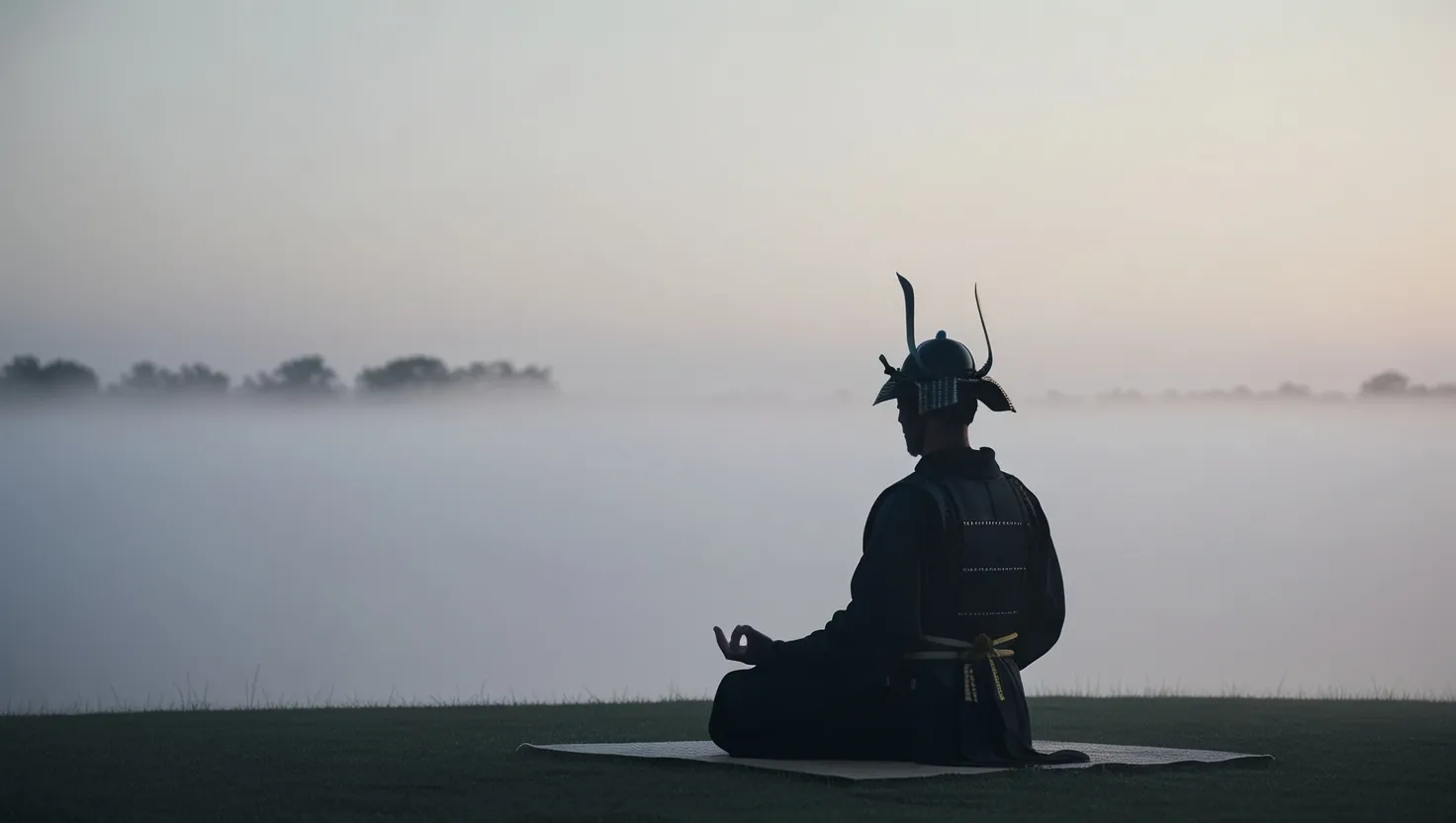Each morning, before daylight spills across the horizon, I invite myself to stillness. Five minutes might sound like nothing, but in those early moments, I am training the hardest muscle I have—my mind. Visualize the ancient samurai, seated in silence, their backs straight and breaths deep. They weren’t waiting for instructions. They were preparing for every possible outcome, using the quiet to separate yesterday’s noise from today’s intention.
“Muddy water is best cleared by leaving it alone.” —Alan Watts
It’s not a grand ritual. I simply find a comfortable seat, close my eyes, and focus on my breathing. Thoughts still arrive unannounced—worries, to-do lists, half-remembered dreams—but I let them drift by. This approach shapes the rest of my day. The world offers a thousand distractions before breakfast, but because I began with silence, I carry a sense of clarity that persists. Those five minutes aren’t about escaping reality; they’re about seeing it as it is.
After meditation, movement follows quickly—another lesson I’ve drawn from the samurai. Their training combined subtlety and strength: every sword stroke mirrored with breath, every stance anchored in balance. Instead of swordplay, I lean into stretching routines, slow tai chi flows, or even yoga sequences. The trick is to attach each movement to the breath, building a rhythm that calms the body while sharpening focus. Ten mindful minutes can have an outsized impact: I start noticing the quiet hum of energy throughout my body, my awareness settling not only in my head but throughout my entire self. Samurai valued flexibility as much as raw power; today, those seemingly simple movements prepare me for the physical and mental demands that await.
“Perfection is not attainable, but if we chase perfection we can catch excellence.” —Vince Lombardi
Intellectual discipline was just as integral for the samurai. They read poetry, explored strategic texts, and wrote reflective journal entries—exercises to keep the mind as nimble as the sword hand. For me, I carve out a dedicated slot—fifteen minutes—strictly for learning. A book on strategy, a complex poem, or a challenging new skill; I engage with it deeply, free from notifications, tabs, or background chatter. This time isn’t only about information. It’s about practicing the art of attention. I notice how tempting it is to check my phone or mentally skip ahead, but sticking with a single topic slowly stretches my ability to focus. It reminds me that even a brief, intentional investment in learning each day creates a momentum that compounds over time.
Have you noticed how often multitasking drains more energy than it saves?
The samurai carried deliberate simplicity into their meals, too. Their diets weren’t luxurious—two carefully planned meals, rooted in what nourished body and mind. I aim for meals built around whole foods. The emphasis isn’t on cutting calories or rigid restrictions, but on eating with awareness. I turn off screens and distractions, sitting with my food, tasting each bite. It sounds basic, but this slows my day down, connects me to the present, and sharpens my respect for what sustains me. It’s an opportunity to reflect: am I eating to fuel myself, to distract, or to escape? The samurai’s relationship to food wasn’t about indulgence, but appreciation and balance.
“We are what we repeatedly do. Excellence, then, is not an act, but a habit.” —Aristotle
As darkness returns, I end the day with quiet reflection. Five minutes, undisturbed, to review the hours that have slipped by. This is neither confession nor self-critique, but honest observation. Where did my choices align with my principles? Was there a moment when anger, impatience, or distraction took the lead? Rather than judgment, I see these moments as data points—signposts guiding tomorrow’s improvements. The samurai called this kaizen: steady, incremental improvement, not overnight transformation.
Questions I like to ask myself: What did I do today that honored my values? Where did I falter, and what was I feeling at the time? Reflection grows my self-awareness, but more importantly, it builds accountability. The goal isn’t perfection, but progress.
There’s another layer beneath all these practices—the Bushido code. It’s easy to fixate on discipline as a list of duties or chores, but for samurai, discipline grew out of loyalty, integrity, and respect. They upheld values like justice, honesty, and courage—not merely as ideals, but as living, daily standards. Modern life asks us to juggle dozens of roles. I find it grounding to clarify which core principles actually guide me. When faced with tough choices, I weigh outcomes against my own version of Bushido. Which value is at stake here? What would loyalty or honor look like in this situation?
“Integrity is doing the right thing, even when no one is watching.” —C. S. Lewis
Incorporating these habits into a busy life isn’t about adding tasks for the sake of productivity. It’s about reducing friction between intention and action. I often hear people say that modern distractions—social media, constant work, endless entertainment—are unique to our generation. While the forms have changed, the underlying challenge remains: how do we live meaningfully in the face of uncertainty and pressure?
Have you tried scheduling even a small window for stillness and noticed any difference in how you respond to stress?
The samurai’s way was never static. They practiced repetition, training mind and body with the same moves, not to achieve novelty, but to turn right action into second nature. There’s wisdom in the repetition. I find that making a small ritual out of things—whether it’s a few slow breaths, a mindful walk, or a simple reflection—creates stability in an otherwise unpredictable world.
It’s tempting to romanticize the samurai life, picturing only the honor or fierce battles. Yet, it was the attention to ordinary moments—eating simply, breathing deeply, sitting quietly—that laid the foundation for greatness. They recognized that life’s sharpest insights happen in the quiet between actions.
Another practice I admire is their conscious relationship with mortality. Samurai would reflect on death daily—not out of morbidity, but as an exercise in fearlessness. For them, to remember that life is temporary meant living with greater urgency and grace. Bringing this into my own life, I use it to stress-test my priorities: if today were my last, would I be content with how I invested my attention and energy?
“Do not seek to follow in the footsteps of the wise. Seek what they sought.” —Matsuo Basho
We live in a radically different era, but the essential question remains: How do we direct our days with purpose, rather than drifting? Samurai practices provide a scaffolding—a way to filter the clamor of modern life, returning focus and intention to the forefront.
Perhaps you already use one or more of these habits. Maybe you wake up with five minutes of quiet, or routinely choose a healthy meal over a quick snack. The power lies in consistency and honest review, not grand gestures.
If you could add just one samurai-inspired practice to your days, which would it be? What small change could you make tomorrow morning to honor your own version of discipline?
By returning to these foundational habits—meditation, mindful movement, focused study, simple nutrition, and evening reflection—I find I am not only more productive, but more centered, compassionate, and resilient. These are not the habits of ancient warriors alone. They are blueprints for anyone who wants to live with greater attention, integrity, and calm amidst the noise of the modern world.
“Control your own destiny or someone else will.” —Jack Welch






